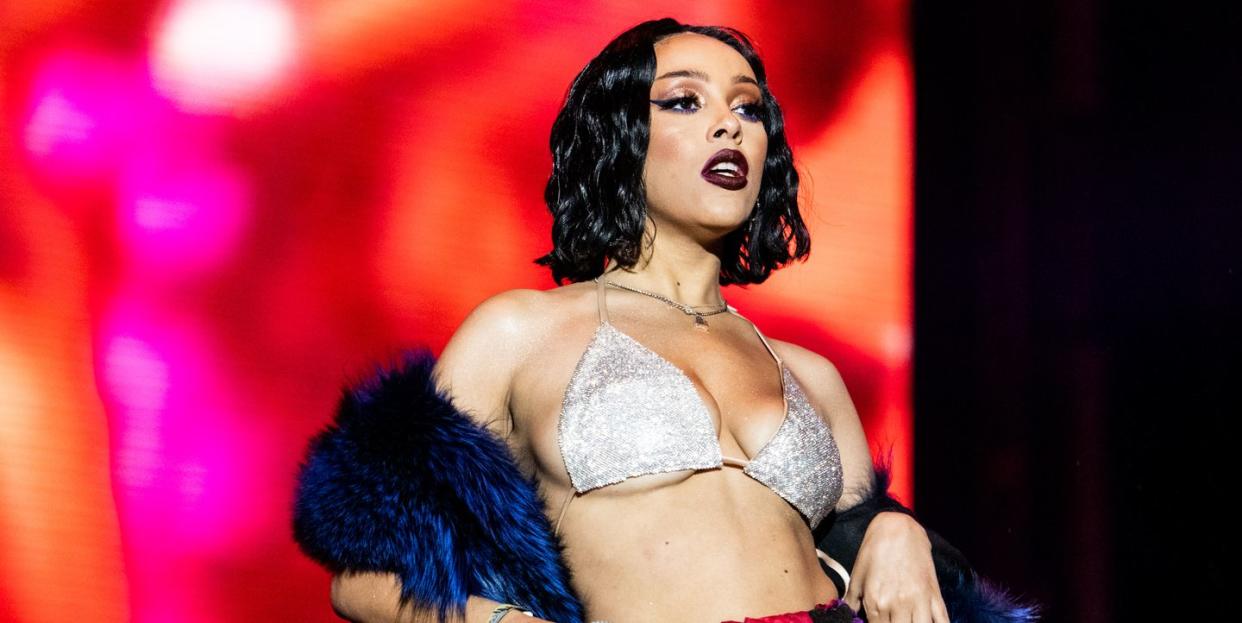Doja Cat Denies Participating in Racist Chat Rooms and Addresses a Leaked Controversial Song

Over the weekend, a video of pop star Doja Cat making sexual comments to people from the alt-right/incel community surfaced online, sparking outrage.
An old song of hers, "Dindu Nuffin," also surfaced—the lyrics and song title were seemingly borrowed from a term that mocked Black victims of police brutality.
Yesterday, the pop star released a statement via Instagram addressing the controversy.
After a weekend embroiled in controversy, Doja Cat released a statement on Instagram yesterday regarding allegations of her showcasing racist behavior.
The controversy began after Twitter users discovered an old song of the pop star's titled "Dindu Nuffin," a term used to mock Black victims of police brutality. Then, recent video footage of Doja Cat making sexual comments to people from the alt-right/incel community, a group of white supremacists with deeply misogynistic ties, in an online chat room surfaced as well.
"I want to address what's been happening on Twitter," the singer began. "I've used public chat rooms to socialize since I was a child. I shouldn't have been on some of those chat room sites, but I personally have never been involved in any racist conversations. I'm sorry to everyone that I offended."
She added that she was proud of her background: "I'm a black woman. Half of my family is black from South Africa and I'm very proud of where I come from."
A post shared by Doja Cat (@dojacat) on May 24, 2020 at 8:10pm PDT
Regarding her controversial song—which many have speculated was a reference to Sandra Bland, who died while under police custody in 2015—Doja Cat called the use of the term a "bad decision."
"It was written in response to people who often used that term to hurt me," she wrote. "I made an attempt to flip its meaning, but recognize it was a bad decision to use the term in my music."
In a 2019 interview with Paper, Doja Cat mentioned frequenting online chat rooms, although she did not name which ones she visits. "People would pick on me and use horrible, horrible language, just the worst, and I just didn't understand why people were so crazy on there," she told the magazine. Instead of leaving these sites, she adapted to their corrosive language. "So I became the person who would make offensive jokes and do things sort of out of the box."
After the singer released her statement, she went on Instagram Live to further address the controversy.
"I'm very sorry to anybody who's taken offense, to anybody who I've hurt using this term," she said. "When I used it, it was because I was in chat rooms all the time, and I was kind of locked away, and I was always on there just dealing with people coming at me left and right talking about different slanderous terms after another. The term that I used in the song is one that I learned that day. So people were calling me it left and right, and I used it in a song."
Doja Cat further addresses racism accusations during new Instagram Live. (Part 1) pic.twitter.com/u9JBOlPG5u
— Pop Crave (@PopCrave) May 26, 2020
Doja Cat further addresses racism accusations during new Instagram Live. (Part 2) pic.twitter.com/iyYoUuCzfY
— Pop Crave (@PopCrave) May 26, 2020
The news of the controversy follows the rapper's record breaking accomplishment earlier this month, being one of four Black women who simultaneously scored the first two spots atop the Billboard Hot 100 Chart.
You Might Also Like


